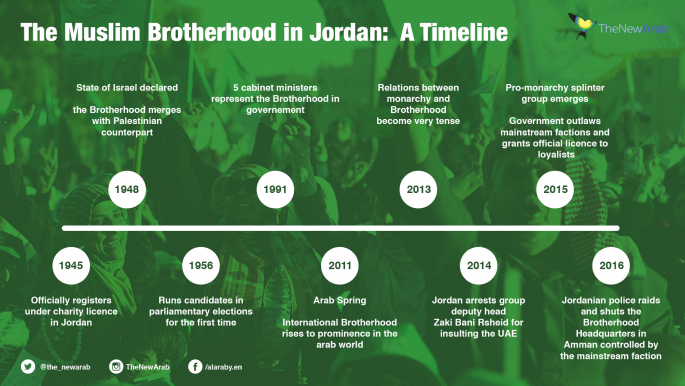Muslim Brotherhood set for return to Jordan parliament
The movement's political arm, the Islamic Action Front party, won 13 of 130 seats, according to preliminary results.
The Muslim Brotherhood-alligned party had candidates on 20 lists, in some areas running jointly with Christians, ethnic minorities and tribal leaders.
Candidates moved away from its traditional Islamist-tinged rhetoric, and focused on domestic issues such as unemployment.
The Islamic Action Front-led alliance is expected to win around 16 seats, Zaki Bani Rsheid, the Brotherhood's second-in-command, told The New Arab.
This is based on predictions from unofficial reports from voting districts.
"The presence of other parties will be very weak," Rsheid told AFP, "The vast majority [of lawmakers] will be made up as usual of deputies already close to power."
The IAF boycotted elections in 2010 and 2013 in protest at the electoral system, which it said weakened parties in favour of tribal and other pro-government candidates.
 |
| [Click to enlarge] |
Its decision to take part Tuesday's election after Jordan amended the electoral law in March is a way of regaining influence after years of ostracism.
"The party's decision to participate in the forthcoming elections follows the amendment in electoral law as well as a general consensus from Jordanian people who want to see our participation," Rsheid told The New Arab.
Almost 24 hours after polls closed, the kingdom's electoral commission had only announced preliminary results for three out of 23 constituencies.
As well as the performance of the Brotherhood's party, attention surrounding Tuesday's polls was focused on the low turnout, with just 1.5 million voters out of a 4.1- million strong electorate opting to cast ballots.
About 1.5 million Jordanians - or 37 percent of eligible voters - cast ballots, compared to 56 percent in 2013.
Election officials said the actual number of ballots cast was higher than in 2013, by more than 200,000, and the pool of potential voters this year was twice as large.
Experts say the low turnout reflects a lack of enthusiasm among voters for a parliament with limited power to affect government policy.
It noted that only one-fourth of voters cast ballots in Jordan's two largest urban centers, the capital, Amman, and the city of Zarqa.
Meanwhile, a 45-member team of international observers said that the election was organized efficiently and held in a "largely peaceful atmosphere".
Speaking at the New York at the UN General Assembly, King Abdullah said Jordan had pulled off a "real victory" by holding successful elections during turbulent times.
"This is a process we are engaged in despite the unrest in the region and the burden of refugees," Abdullah said.
Agencies contributed to this report.



